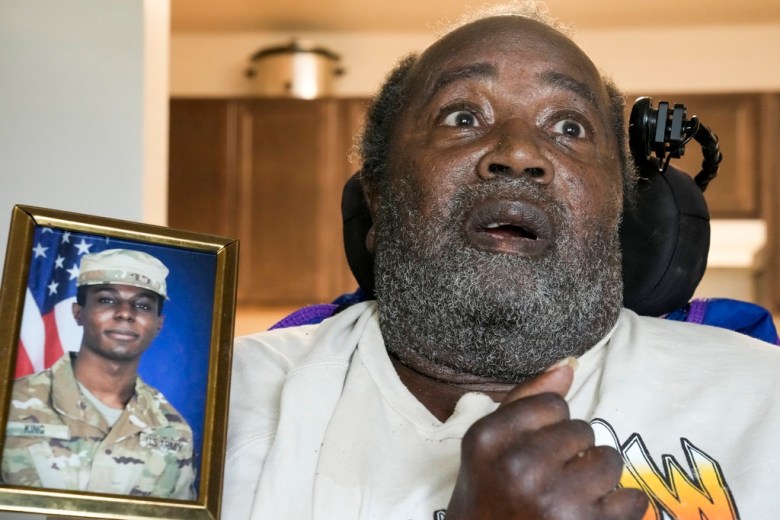By Aamer Madhani and Hyung-Jin Kim
The Associated Press
WASHINGTON (AP) — The White House on July 20 expressed deep concern about the well-being of a African-American soldier who bolted across the heavily armed North Korea border earlier this week as North Korean officials have yet to respond to U.S. requests for basic information about the AWOL soldier.
The history of rough treatment of Americans detained by North Koreans — including the 2017 death of a 22-year-old student after he was flown home in a vegetative state after 17 months in captivity — is top of mind as U.S. officials seek answers about Pvt. Travis King.
“This is not a country that is known for humane treatment of Americans or actually anybody else for that matter,” White House National Security Council spokesman John Kirby said. “We don’t know where he is. We don’t know the conditions in which he’s living right now. And it’s the not knowing that is deeply concerning to us and we’re trying as best we can to get as much information as we can about him.”
Without mentioning the soldier, North Korea’s defense minister issued a veiled threat July 20, suggesting the docking of a nuclear-armed U.S. submarine in South Korea could be grounds for a nuclear attack by the North. North Korea has used such rhetoric before, but the latest threat could signal just how strained ties are right now.
King, who was supposed to be on his way to Fort Bliss, Texas, after finishing a prison sentence in South Korea for assault, ran into North Korea while on a civilian tour of the border village of Panmunjom on Tuesday. He is the first known American held in North Korea in nearly five years.
According to a U.S. official, King — who chose to serve his time at a labor camp rather than pay the nearly $4,000 fine — has been declared AWOL. The punishment for being away without leave can include confinement in the brig, forfeiture of pay or dishonorable discharge and it is largely based on how long they were away and whether they were apprehended or returned on their own. The official spoke on condition of anonymity to discuss a sensitive matter.
King, 23, has not been declared a deserter, which is a far more serious offense. Often the military waits for a period of time to see if a service member returns, but that is very uncertain in this case. Desertion can result in imprisonment of as much as three years, and — in times of war — can carry the death penalty.
Sabrina Singh, a Pentagon spokeswoman, told reporters on July 20 that King was not escorted all the way to the gate because he was not in custody and there was no anticipation that he would not get on the plane to go home.
Military personnel escorted him to the passport control area and were not allowed to go farther than that. Singh said he confirmed to the U.S. military that he was near the gate. King knew he was returning to Texas to face likely discharge.
Asked if King is alive, Singh said the U.S. does not know his health condition.
She said it is “not our assessment” that King represents a security threat or liability, when asked if he had intelligence that North Korea would want. She added that the department has no indication that King’s decision to run into North Korea was pre-planned or organized with Pyongyang.
Asked whether the U.S. feared that King could be mistreated or tortured by the North, Kirby responded that North Korea is a “brutal regime” but that the U.S. is still not in position to confirm how he is being treated.
Otto Warmbier, a University of Virginia student, was seized by North Korean authorities from a tour group in January 2016 and convicted of trying to steal a propaganda poster and sentenced to 15 years of hard labor. He served 17 months before being returned to the U.S. in a vegetative state.
While not providing a clear reason for Warmbier’s brain damage, North Korea denied accusations by Warmbier’s family that he was tortured and insisted it had provided him medical care with “all sincerity.”
The U.S. and North Korea, which fought during the 1950-53 Korean War, are still technically at war since that conflict ended in a truce, not a peace treaty, and have no diplomatic ties. Sweden provided consular services for Americans in past cases, but Swedish diplomatic staff reportedly haven’t returned since North Korea ordered foreigners to leave the country at the start of the COVID-19 pandemic.
The U.S. can also reach North Korea via a hotline at the U.S.-led U.N. Command in Panmunjom — known as the ” pink phone.”
The State Department confirmed on July 19 it has reached out to officials in South Korea and Sweden for help reaching the North Koreans. Jeon Ha-kyu, a spokesperson of South Korea’s Defense Ministry, said July 20 his ministry is sharing information with the American-led U.N. Command in South Korea, without elaborating.
The motive for King’s border crossing is unknown.
Relatives described Pvt. Travis King, 23, as a quiet loner who did not drink or smoke and enjoyed reading the Bible. After growing up in southeast Wisconsin, he was excited about serving his country in South Korea. Now King’s family is struggling to understand what changed before he dashed into a country with a long history of holding Americans and using them as bargaining chips.
“I can’t see him doing that intentionally if he was in his right mind,” King’s maternal grandfather, Carl Gates, told The Associated Press from his Kenosha, Wisconsin, home. “Travis is a good guy. He wouldn’t do nothing to hurt nobody. And I can’t see him trying to hurt himself.”
Family members said the soldier may have felt overwhelmed by the legal trouble in South Korea, which could lead to a discharge from the military.
King, who was serving in South Korea as a cavalry scout with the 1st Armored Division, was released earlier this month after 47 days of hard labor in the prison camp. In February, a Seoul court fined him 5 million won ($3,950) after convicting him of assaulting someone and damaging a police vehicle, according to a transcript of the verdict obtained by The Associated Press. The ruling said King had also been accused of punching a man at a Seoul nightclub, though the court dismissed that charge because the victim didn’t want King to be punished.
___
Kim reported from Seoul, South Korea. Associated Press writers Kim Tong-hyung in Seoul, South Korea, Lolita C. Baldor and Matthew Lee in Washington; Scott Bauer in Madison, Wisconsin; and Melissa Winder in Kenosha, Wisconsin, contributed to this report.
The post US, relatives worried about American soldier who ran across North Korean border appeared first on AFRO American Newspapers .











